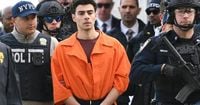In a shocking turn of events, U.S. Attorney General Pam Bondi announced on April 1, 2025, that federal prosecutors will seek the death penalty for Luigi Mangione, the man accused of murdering UnitedHealthcare CEO Brian Thompson. This case has garnered widespread attention, not only for its tragic nature but also for the implications it carries regarding the current administration's stance on capital punishment.
Thompson was fatally shot on December 4, 2024, outside a Manhattan hotel where he was about to attend an investor conference for UnitedHealth Group, the parent company of UnitedHealthcare. At 50 years old, Thompson was a well-respected figure in the healthcare industry, leaving behind two children who are now without their father.
Bondi characterized Thompson's murder as a "premeditated, cold-blooded assassination that shocked America." In her statement, she emphasized the administration's commitment to combatting violent crime, stating, "After careful consideration, I have directed federal prosecutors to seek the death penalty in this case as we carry out President Trump's agenda to stop violent crime and Make America Safe Again." This marks the first time the Justice Department has pursued the death penalty since Trump resumed office in January 2025.
Luigi Mangione, a 26-year-old Ivy League graduate, has been charged with both federal and state murder offenses. The federal charges include murder through the use of a firearm, which carries the possibility of the death penalty, while the state charges could lead to life imprisonment. Mangione has pleaded not guilty to the state charges and has yet to enter a plea in the federal case.
According to prosecutors, Mangione's actions were fueled by a deep-seated animosity towards the healthcare industry, as evidenced by writings and words on bullets recovered from the crime scene. Surveillance footage captured a masked gunman, later identified as Mangione, shooting Thompson from behind. The bullets were inscribed with terms like "delay," "deny," and "depose," reflecting a common criticism of health insurers that many believe deny critical care to patients.
In the aftermath of Thompson's death, the healthcare sector reacted swiftly. Many health insurers transitioned to remote work or held online shareholder meetings out of concern for safety. However, Mangione has also attracted a following of supporters who view his actions as a form of protest against the perceived injustices of the healthcare system.
Upon his arrest on December 9, 2024, in Altoona, Pennsylvania, Mangione was found in possession of a 9mm handgun that matched the one used in the shooting, along with a silencer, fake IDs, and a notebook containing what prosecutors have termed a "manifesto." This notebook reportedly included a chilling entry from August 2024 stating, "the target is insurance" because "it checks every box," and another from October expressing an intent to "wack" an insurance company CEO.
Bondi's decision to pursue the death penalty comes on the heels of lifting a moratorium on federal executions that had been established during the Biden administration. In his last weeks in office, Biden commuted the sentences of 37 of the 40 individuals on federal death row, converting their sentences to life imprisonment. This shift in policy has reignited the debate surrounding capital punishment in the U.S.
As the case unfolds, Mangione's defense attorney, Karen Friedman-Agnifilo, has voiced her strong opposition to the death penalty pursuit, labeling it a politically motivated decision. She stated, "By seeking to murder Luigi Mangione, the Justice Department has moved from the dysfunctional to the barbaric." Agnifilo argues that the decision contradicts the recommendations of local federal prosecutors and historical precedent.
Agnifilo has also raised concerns about the potential for "warring jurisdictions" to complicate the case, arguing that Mangione is being treated as a "human ping-pong ball" between state and federal courts. She is seeking to suppress some of the evidence gathered during his arrest, asserting that there is no substantial evidence linking Mangione to the threats made against individuals connected to the case.
Despite the serious charges against him, Mangione has garnered a significant amount of support from individuals who share his frustrations with the healthcare system. Internet commentary has shown a mix of outrage against UnitedHealthcare and sympathy for Mangione, with some expressing admiration for his radical actions.
The implications of this case extend beyond the courtroom, as it raises questions about the ethics of capital punishment and the complexities of the American healthcare system. Many are concerned that Mangione's actions may be glorified, potentially leading to further violence against healthcare professionals and executives.
As the trial approaches, the nation will be watching closely. Mangione remains in custody at the Metropolitan Detention Center in Brooklyn, New York, where he is housed alongside other high-profile inmates.
The legal proceedings will likely unfold over the coming months, with both sides preparing for a contentious battle in court. With the stakes higher than ever, the outcome of this case could set significant precedents regarding the use of the death penalty in the U.S. and the public's perception of the healthcare industry.
As the narrative continues to develop, it is clear that the case of Luigi Mangione will not only determine his fate but also reflect broader societal issues that resonate with many Americans.









